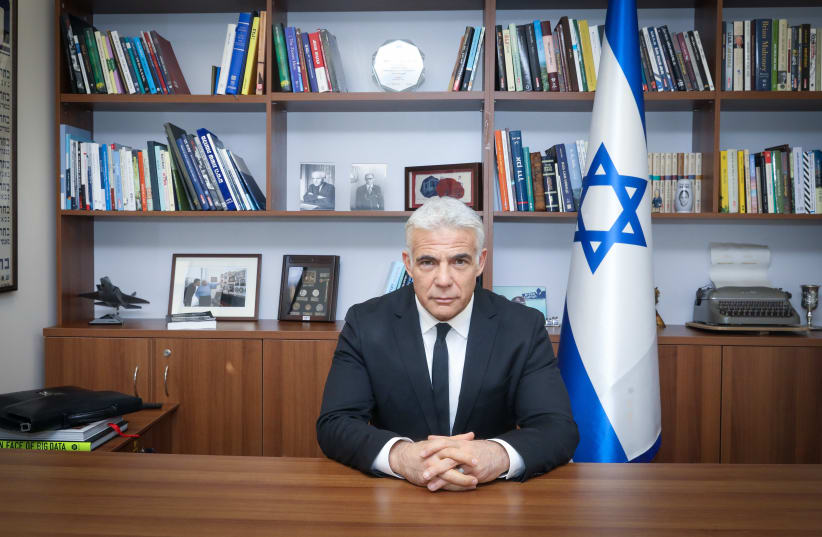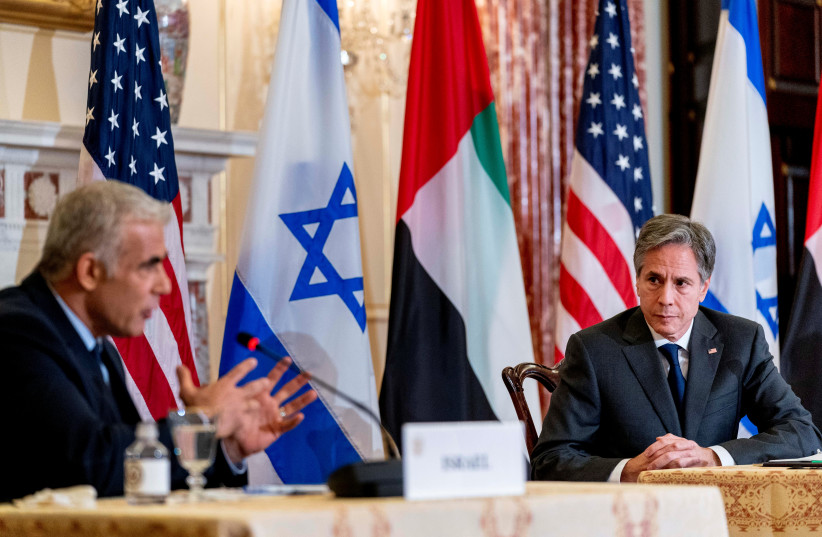Expressing optimism about the prospect of normalization with Saudi Arabia, Foreign Minister Yair Lapid told The Jerusalem Post this week that the direction seems positive and that if anything moves on establishing official relations between Israel and the kingdom, it will be “with baby steps.”
Will Saudi-Israel relations happen?
“It’s going to take time,” Lapid said in an interview on Monday, marking one year since the establishment of the government, which will appear in Friday’s Magazine. “The Abraham Accords were an explosion, and the year afterward, I spent the first three months of being foreign minister on a plane, going to open embassies in places we never dreamed of opening embassies."
“With Saudi Arabia, if it will happen, it’ll happen with baby steps," he said. "But I think some of those steps are being taken. I think that the American administration is game for this process, and we appreciate that.”
The heart of the Accords - America
When asked if Americans were playing a more active role than in the past, Lapid said he believed they were.
“Israel has a lot to offer the world in general,” he said, explaining why countries like Saudi Arabia and others would want to normalize relations with the Jewish state. “There’s an arc going from regional security architecture to innovation, to water and energy and so on and so forth. Israel is a superpower in some fields, and we are more than willing to share those abilities.”
Lapid downplayed threats to the coalition (the interview was held before reports on Wednesday that Justice Minister Gideon Sa’ar has been negotiating with Likud), saying: “Every week, I come in here with people who are telling me this is over, and I say, 'Wow, that is really sad.' And then we win each and every vote, or almost each and every vote – not without agony, not without some pain in the room, but it’s okay.”
What about Iran?
Turning to Iran, Lapid said that if a new deal is reached between the Western powers and the Islamic Republic, it would not apply to Israel.
“It doesn’t apply to us in any way, and we are going to do whatever is necessary to make sure Iran doesn’t become a threshold nuclear country,” he said.
“It doesn't apply to us in any way and we are going to do whatever is necessary to make sure Iran doesn't become a threshold nuclear country”
Foreign Minister Yair Lapid
What that could mean might be understood from events that have been attributed to Israel in the last few months. The covert actions that were blamed on Israel include the bombing of a drone factory in Iran earlier this year, the assassination of a top IRGC officer in Tehran last week and the attack days later against a secretive Iranian military-nuclear facility with suicide drones.
Lapid, naturally, would not comment on any of the above. But when asked if there has been a change in Israeli policy regarding what it is willing to do against Iran, he said: “We have told the world we are not willing to take it anymore. Iran says we can bring the war to your doorstep, because you will never bring it to ours. This is not going to happen. This is not how it’s going to play" out.
“I understand why they felt that this is how it worked in previous years, but it’s not going to work with this government," the foreign minister said. "If the Iranians are bringing war to our doorstep, then they’re going to find war at theirs. If they want to avoid it, then we will avoid it as well.”

